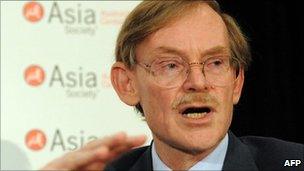World Bank chief Zoellick says markets in danger zone
- Published

World markets have entered a "new danger zone", the president of the World Bank has warned.
Robert Zoellick said investors had lost confidence in the economic leadership of several key countries.
Speaking at the Asia Society's annual dinner in Sydney, he also said that the global economy was going through a "multi-speed recovery".
Developing countries were now the source of growth and opportunity, Mr Zoellick said.
In the past two weeks, global stock markets have suffered massive falls on fears about the state of leading economies.
The US had its AAA debt rating cut for the first time in its history by the rating agency Standard & Poor's, following a long and bitter row in Congress over a plan to raise the US debt ceiling to ensure the country avoided a default.
In Europe, rumours emerged that France would also have its top-notch rating downgraded, although this was widely denied, while Italy announced its second austerity plan in as many months.
'Fragilities of recovery'
"What's happened in the past couple of weeks is there is a convergence of some events in Europe and the United States that has led many market participants to lose confidence in economic leadership of some of the key countries," Mr Zoellick said.
"I think those events combined with some of the other fragilities in the nature of recovery have pushed us into a new danger zone. I don't say those words lightly."
He said he was making the point so that policy makers would take it seriously.
On the US, he said markets were not afraid that the world's biggest economy faced an imminent problem, but that they had got used to the US "playing a key role in the economic system and leadership".
The eurozone faced more serious problems, he said, with a lot of member states "moving from drama to trauma".
But he said Australia was in a much better position than other developed countries because of structural reforms it had already undertaken.
On China, he said the appreciation of the yuan would would help reduce inflationary pressures in the country.